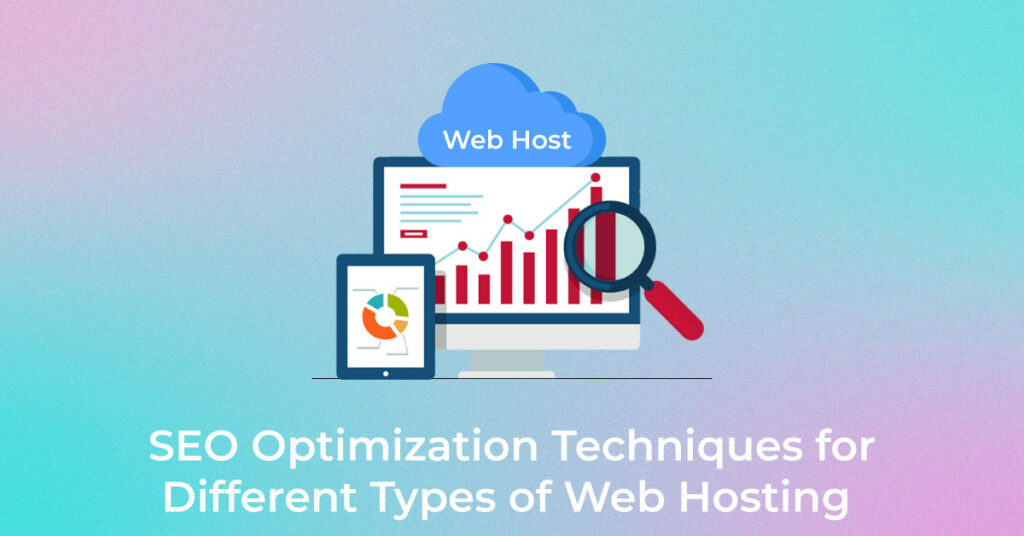|
Getting your Trinity Audio player ready...
|
SEO is a topic you can’t get away from if you’re putting out content online. The fact is, if you want to get the best results, your SEO needs to be on point. But did you know that your web hosting and your SEO can affect each other?
Chances are you chose your web host ages ago and didn’t even think about it again. But if your traffic could do with a bit of a boost, it might be worth considering different SEO optimization techniques for different types of web hosting.
To be clear, SEO is SEO. It won’t change vastly between different types of web hosting, but small, subtle things could make a more significant difference than you realize. Here’s what we recommend learning and doing.

How Do SEO and Web Hosting Affect Each Other?
Optimizing your website for SEO is essential. But if your web hosting is working against you, all your SEO efforts may be wasted. Web host factors that play a role in SEO include:
- Page loading speed: If your site doesn’t load within 3 seconds, your hard-done SEO won’t even matter because more than half of visitors will leave the page.
- Uptime: If your web host isn’t meeting the industry-standard 99.9% uptime, your site could be offline when Google indexes, causing it to label your site as unreliable.
- Security: Google implements security standards, and if you don’t meet them, your website will be ranked lower despite having great on-page SEO.
- Server location: If your web host’s server is located far from your visitor’s computer, you’ll rank further down the list or not at all on their search.
You can SEO your site to a T, but if your web host isn’t working with you, you’ll still face challenges in terms of traffic.

Unleash your website's potential by harnessing Infidigit's 400+ SEO audit to achieve peak site health & dominance on Google organic search.
Looking for an extensive
SEO Audit for your website?
Unleash your website's potential by harnessing Infidigit's 400+ SEO audit to achieve peak site health & dominance on Google organic search.

Different Types of SEO to Be Aware Of
SEO isn’t just adding a bunch of keywords to every page. There are three types of SEO that make a difference, and you need all three to be good for the best results. Let’s run through the different types of SEO quickly so you know what you should optimize.
On-Page SEO
On-page SEO refers to all the content on your various website pages. That means the keywords on your website pages and the content in your blog posts, but also backend things like your web page title tags, alternate text on images, meta descriptions, and even internal links.
Off-Page SEO
Off-page SEO refers to things that don’t actively happen on your website pages. By far, the biggest aspect here is backlinks—the websites out there that have linked back to yours. If you
have multiple high-authority sites linking back to yours, Google raises your Page Authority. Social media marketing and writing guest blog posts can count here too.
Technical SEO
Technical SEO is an umbrella term for any action you take to improve your search results without making changes on your own content or getting other websites involved. These can include fixing broken links, optimizing your site for mobile use, and boosting your website speed.
How to Optimize SEO for Different Types of Web Hosting
So, now you know how web hosting and SEO affect each other. But how do you optimize your SEO for the type of web hosting you have? Here are some ideas for each type of web hosting to boost your SEO.
Shared Hosting
Shared hosting can present challenges for SEO, as your website has to share resources with multiple others. If your neighboring website has a bit of a traffic boost, it slows down every other site on the server, including yours.
In most cases, shared hosting doesn’t offer many options for you to make changes on the backend. But there are definitely a few things you can easily do that can help to boost your SEO despite sharing resources.
- Optimize Your Images: Make sure they’re the right size for the web, and avoid placing images if not necessary. Compress them if they’re too chunky.
- Delete Unused Files: Stay on top of your website’s files and get rid of any that aren’t being used. These could be images, videos, plugins, hidden pages, or any other files.
- Use an Excellent CDN: A CDN distributes your website’s files across servers worldwide, reducing SEO issues with the server being too far away from the user.
- Enable Caching: This allows the server to store copies of your website, so if a user returns, it uses those files instead of reaching out to the server to view the originals.
- Use a Website Monitoring Tool: Something like Google Analytics will give you valuable insight into your traffic and uptime and help you spot patterns that could be problems.
- If Possible, Use SSD Storage: Solid-state drives are much faster than regular hard-drives. If possible, choose a web host that offers this option.
Virtual Private Server (VPS) Hosting
All of the above points are true for VPS hosting as well. It’s in your best interest to optimize your website speed as much as possible, no matter what kind of hosting you’re on, because this has a big impact on SEO. In addition, you should:
- Monitor Resource Usage: Use a tool to monitor which resources are being used for what. This will help you to see if certain applications or plugins are using up too many of your resources, allowing you to make smart changes to free up resources if necessary.
- Prioritize Critical Functions: If you see that a lot of resources are going towards less important functions, you may want to disable those and prioritize the functions that are truly critical to the effective running of your website.
Dedicated Hosting
If you’re using managed dedicated hosting, most of the hard work should be done for you, and you’ll just need to make small changes (like those already mentioned above) to optimize your site’s SEO.
However, there are some things you should pay particular attention to (and that you can do yourself) in order to boost your SEO.
- Disable Hotlinking: When someone copies the link of an image on your site and sticks it on theirs, their website has to dive into YOUR site’s files every time the link-stealer gets a visitor. Disable this (it’s called hotlinking), and it’ll make a real difference.
- Go For a Cloud-Based Security Tool: If you’re on a dedicated server, you can install whatever third-party apps you wish without any issue. But if you want another tough layer of security (which does wonders for SEO) without taking up memory on your server, find a cloud-based security app.
- Tweak Your Site’s Priority Settings: Flip the switch on your server from “normal priority” to “high priority.” It’s a small step, but it can make quite a difference in improving your SEO.
Cloud Hosting
Cloud hosting is at the top of the pop. Many (sometimes even all) of the SEO-related issues disappear with a cloud web host. Aside from choosing a reliable one, you can also take a few actions yourself to double up on performance.
- Optimize for Voice Search: Voice search is becoming more popular daily. If you really want to boost SEO with something many people are behind on, don’t just optimize your stuff for typical SEO keywords; add more natural “spoken” phrases into it as well. Also, provide short, sweet answers to commonly searched Qs.
- Prioritize Quality Content: Excellent content is what gets backlinks and shares. That’s the crux of it! Your first checkbox should be providing value to your readers if you’re serious about getting people to your site organically.
- Use Cloud Analytics: Most cloud-based hosts have impressively advanced analytics for you to check out, so you can monitor all the important stuff on your site (traffic, resource usage, etc.).
- Do A/B Testing: A/B testing is usually an email thing, but cloud hosts offer it on your website and all its elements. Please take advantage of it to test what works best for SEO!
Conclusion
Some SEO optimization techniques are going to be important no matter what type of web hosting you’re using. But every little bit helps, so if you aren’t quite happy with the traffic coming in or where you’re ranking on the Google SERP, try some of these ideas before you go to all the effort of switching to a different web host.
If you’ve tried everything and you’re still struggling to get your web host and SEO to come right… Well, then it might just be time to find yourself a more SEO-friendly web hosting company.
Popular Searches
How useful was this post?
4.4 / 5. 15















